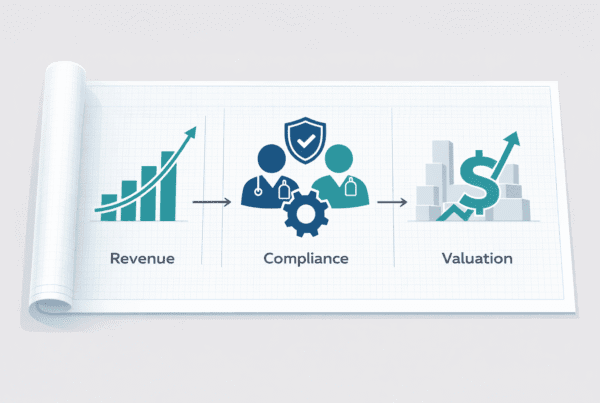
Discover the crucial roles of financial advisors and valuation experts in Healthcare M&A. Learn how they determine your practice’s true worth and ensure a compliant, profitable exit.
As a physician-owner, you know the clinical value of your practice inside and out. But when it’s time to sell, determining its financial value can feel like a shot in the dark. A successful transaction doesn’t happen by accident; it’s built on a credible, defensible valuation that stands up to the intense scrutiny of sophisticated buyers.
This is where your “numbers team”—specialized financial advisors and valuation experts—becomes indispensable. These professionals provide the objective analysis and strategic guidance needed to maximize your outcome. As key members of your advisory team, they work to translate your years of hard work into a clear financial result.
Financial Advisor vs. Valuation Expert: Distinct but Complementary Roles
While the terms are sometimes used interchangeably, financial advisors and valuation experts perform distinct functions. Understanding the difference is key to building an effective advisory team. Your financial advisor is the strategist, while the valuation expert is the technical analyst.
The Financial Advisor: Your Strategic Guide
A healthcare M&A financial advisor acts as the deal’s quarterback. They leverage the valuation expert’s analysis to frame your practice’s story, identify the right buyers, and negotiate the best possible terms. Their focus is on the big picture: structuring a deal that meets your financial and personal goals. They are your chief advocate in the market.
The Valuation Expert: The Master of Fair Market Value
A valuation expert dives deep into your financials to produce a precise and defensible calculation of Fair Market Value (FMV). Their work is highly technical and data-driven, using established methodologies to arrive at a number. Critically, their analysis ensures the proposed transaction is compliant with strict healthcare regulations like the Stark Law, protecting you from future legal and financial risk.
Here’s a clear breakdown of their responsibilities:
| Function | Financial Advisor | Valuation Expert |
|---|---|---|
| Strategic Planning | Identifies strategic buyers and partnership opportunities | Assesses and quantifies key value drivers |
| Deal Structuring | Guides negotiations on terms, earnouts, and equity | Quantifies synergies and financial impact of structures |
| Regulatory Guidance | Navigates state/federal review processes | Ensures the valuation complies with Stark Law & FMV |
| Pricing | Uses valuation to support pricing and optimize terms | Calculates the specific FMV using multiple methods |
| Due Diligence | Coordinates the flow of financial and operational data | Prepares detailed valuation models and financial reports |
How Experts Determine Your Practice’s True Value
Valuing a medical practice is a disciplined process that goes far beyond a simple “rule of thumb.” It involves a multi-step financial analysis designed to present your practice’s performance in a way that institutional buyers understand and trust.
Step 1: Calculating Adjusted EBITDA
The starting point for any serious valuation is EBITDA (Earnings Before Interest, Taxes, Depreciation, and Amortization). But for a physician-owned practice, the key metric is Adjusted EBITDA. You can learn more in our guides, EBITDA Explained for Physicians and the complete EBITDA Normalization Guide.
Adjusted EBITDA normalizes your earnings by adding back owner-related and one-time expenses that a new owner would not incur. This creates a true picture of the practice’s profitability. Common adjustments include:
* Owner’s Salary: Adjusting an above-market owner’s salary down to a fair-market rate.
* Personal Expenses: Adding back costs run through the business, such as personal vehicles, travel, or family salaries.
* One-Time Costs: Removing expenses from unusual events, like a major facility repair or a one-time legal settlement.
This process is fundamental. An unadjusted P&L can drastically understate your practice’s true earning power.
Step 2: Applying the Right Valuation Multiple
Once a credible Adjusted EBITDA is established, it’s multiplied by a valuation “multiple” to arrive at an Enterprise Value (EV). This multiple is not arbitrary; it reflects the market’s perception of your practice’s risk and growth potential.
Factors that influence the multiple include:
* Specialty: High-demand specialties like dermatology, fertility, and ophthalmology often command higher multiples. You can see ranges in our guide to Valuation Multiples by Medical Specialty.
* Scale: Practices with higher EBITDA (e.g., over $1M) are seen as less risky and receive higher multiples.
* Provider Reliance: A practice that depends less on a single owner-physician and has a strong team of associate providers is more valuable.
* Payor Mix: A stable mix of in-network commercial insurance is generally viewed more favorably than a high reliance on out-of-network or government payors. The impact of payor mix on valuation can be significant.
Step 3: Calculating Your Net Proceeds
Enterprise Value is the total value of the practice, but it’s not the amount you’ll receive at closing. To estimate your net proceeds, you must subtract any debt, transaction fees, and potential working capital adjustments from the EV. An experienced advisor models these scenarios to give you a realistic expectation of your take-home amount.
Why Your Long-Time CPA Is Not a Valuation Specialist
Many physicians ask, “Can’t my CPA just handle the valuation?” While your CPA is an essential advisor for tax planning and historical accounting, they are typically not equipped for M&A valuation.
Their focus is different. A CPA’s goal is often to minimize your tax liability by maximizing deductions, which can make your reported profitability appear lower. An M&A valuation expert’s goal is to present the maximum defensible cash flow to a buyer.
Using a non-specialist carries serious risks:
1. Leaving Money on the Table: Without deep market knowledge, you may undervalue your practice.
2. Deal Failure: A valuation that doesn’t hold up during a buyer’s due diligence can kill a deal.
3. Regulatory Penalties: An improper valuation can lead to violations of federal laws. For a deeper look, see our guide on Navigating Stark Law & Anti-Kickback.
The Critical Deliverable: The Quality of Earnings (QoE) Report
The culmination of a valuation expert’s work is often a Quality of Earnings (QoE) report. This is not just a simple valuation summary. It is a comprehensive financial due diligence report that validates your Adjusted EBITDA through rigorous analysis.
Private equity firms and other sophisticated buyers see a sell-side QoE as a sign of a serious, well-prepared seller. It provides a credible, third-party analysis of your earnings, revenue trends, and working capital. By preparing a QoE before going to market, you control the financial narrative, build buyer confidence, and significantly accelerate the transaction timeline. Learn more in our Quality of Earnings (QoE) Analysis guide.
How SovDoc Delivers Valuation Clarity
Understanding your practice’s true value is the first step toward a successful exit. At SovDoc, we integrate financial and valuation expertise directly into our M&A process to ensure you are positioned for maximum value.
- PE-Grade Financial Models: We build the same detailed financial models that top-tier buyers use, allowing you to see your practice through their eyes.
- Proprietary Market Data: We use a proprietary database of transactions to apply current, relevant specialty-specific EBITDA multiples.
- Strategic Narrative Framing: We don’t just present numbers; we craft a compelling story around your practice’s growth potential that justifies a premium valuation.
- Pre-Sale Optimization: We identify operational and financial tune-ups you can make before a sale to measurably improve your EBITDA and final valuation.
Getting a professional practice valuation is about more than just finding a number. It’s about gaining the strategic clarity needed to make one of the most important decisions of your career. It also helps you understand the financial advisor compensation models that drive these outcomes.
If you’re ready to understand what your practice is truly worth, contact us for a confidential discussion.
Frequently Asked Questions
What is the difference between a financial advisor and a valuation expert in selling a medical practice?
A financial advisor acts as the strategist guiding the deal, managing negotiations, and using valuation data to secure optimal terms. Conversely, a valuation expert is a technical analyst who calculates the Fair Market Value (FMV) of the practice and ensures regulatory compliance. The advisor focuses on deal strategy and pricing, while the expert focuses on precise valuation and compliance with laws like Stark Law.
Why can’t my CPA accurately value my medical practice for a sale?
CPAs primarily focus on retrospective accounting and tax minimization, which might undervalue your practice’s profitability to reduce tax liabilities. In contrast, valuation experts are forward-looking and market-focused, aiming to present the maximum defensible cash flow to buyers. Using a CPA alone risks undervaluation, deal failure, and regulatory non-compliance.
How is the value of my medical practice determined during a sale?
The value is determined through a three-step process: 1) Calculating Adjusted EBITDA by normalizing earnings to reflect true profitability. 2) Applying a valuation multiple that reflects factors such as specialty, scale, provider reliance, and payor mix. 3) Calculating your net proceeds by subtracting debts, fees, and adjustments from the Enterprise Value. This approach ensures a credible, defensible valuation trusted by sophisticated buyers.
What is a Quality of Earnings (QoE) report and why do I need it?
A QoE report is a comprehensive financial due diligence document that validates the Adjusted EBITDA through rigorous analysis of revenue quality, margins, and adjustments. It’s essential for building buyer confidence, controlling the financial narrative, and accelerating the transaction timeline. Sophisticated buyers like private equity firms often require a QoE as proof of a serious, well-prepared seller.
How does a valuation expert ensure compliance with healthcare regulations like Stark Law during a practice sale?
Valuation experts use established methodologies to calculate Fair Market Value (FMV) that comply with healthcare regulations such as Stark Law and Anti-Kickback statutes. Their precise and data-driven valuations minimize legal and financial risks by ensuring the transaction terms meet regulatory standards, protecting the seller from future penalties and deal complications.



